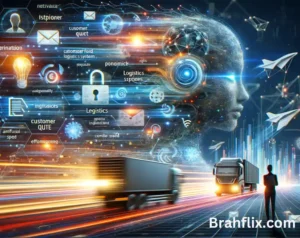Introduction
Artificial Intelligence (AI) is profoundly transforming various sectors, and the entertainment industry is no exception. From enhancing content creation to personalizing viewer experiences, AI is at the forefront of reshaping how we consume and interact with entertainment. As technology advances, AI-driven innovations are increasingly influencing movies, music, gaming, and even live performances.
In this article, we will explore how AI is reshaping entertainment, focusing on its impact on content creation, audience engagement, and industry trends. We’ll delve into the latest AI applications, the benefits they bring, and the challenges they pose.
Key Takeaways
- Content Creation: Discover how AI tools are revolutionizing the production of movies, music, and games.
- Personalization: Learn about AI’s role in tailoring entertainment experiences to individual preferences.
- Industry Trends: Explore current trends and future directions driven by AI in the entertainment sector.
- Challenges and Considerations: Understand the challenges and ethical considerations associated with AI in entertainment.
1. The Evolution of AI in Entertainment
AI’s journey in the entertainment industry has been nothing short of revolutionary. Initially, AI’s role was limited to basic tasks, but it has now evolved into a transformative force reshaping how content is created and consumed.
Early Applications of AI
In its early days, AI in entertainment was primarily used for automation and data analysis. Simple algorithms were employed to manage large datasets, analyze viewer preferences, and streamline administrative tasks. However, as AI technology advanced, its applications expanded significantly.
Breakthrough Innovations
Today, AI is involved in nearly every aspect of the entertainment industry, from scriptwriting and music composition to game development and film editing. Advances in machine learning, natural language processing, and computer vision have enabled more sophisticated and creative uses of AI.
Impact on Industry Practices
AI has shifted industry practices by introducing new tools and methodologies. For instance, AI-driven software can now generate realistic visual effects, compose original music, and even write scripts. This evolution has led to a more efficient production process and a broader range of creative possibilities.
2. AI in Content Creation: Movies, Music, and More
AI’s influence on content creation is perhaps the most visible and impactful. In the realms of movies, music, and other forms of media, AI is enabling creators to explore new creative avenues and streamline production processes.
AI in Film Production
AI-driven tools have revolutionized film production in several ways:
- Scriptwriting: AI algorithms can analyze vast amounts of existing scripts and generate new ones based on popular themes and structures. These tools help screenwriters brainstorm ideas and refine dialogue.
- Visual Effects: AI is used to create realistic visual effects and animations. Machine learning models can enhance CGI quality, create lifelike characters, and automate complex visual tasks.
- Editing and Post-Production: AI tools assist in editing by automating tasks such as color correction, sound mixing, and scene transitions. This reduces the time and effort required in post-production.
AI in Music Creation
In the music industry, AI is making waves with its ability to:
- Compose Music: AI can generate original compositions by learning from existing music patterns and styles. Tools like OpenAI’s MuseNet can compose pieces across various genres.
- Personalize Playlists: Streaming services use AI algorithms to analyze user listening habits and recommend personalized playlists and tracks.
- Enhance Production: AI-powered software aids in mixing and mastering music, making the production process faster and more efficient.
AI in Gaming
AI is transforming the gaming industry by:
- Creating Realistic Environments: AI algorithms generate realistic and dynamic game environments, enhancing player immersion.
- Improving NPC Behavior: AI enhances non-player character (NPC) behavior, making them more responsive and intelligent.
- Personalizing Experiences: AI tailors gaming experiences based on player preferences, skill levels, and playstyles.
3. Personalization: AI Tailoring Entertainment Experiences
One of AI’s most exciting applications in entertainment is its ability to personalize experiences for individual users. By analyzing user data and preferences, AI creates tailored content and recommendations that enhance user satisfaction.
Personalized Content Recommendations
- Streaming Services: Platforms like Netflix and Spotify use AI to analyze viewing and listening habits, offering personalized content recommendations. Algorithms consider factors such as genre preferences, viewing history, and user ratings.
- Advertising: AI-driven advertising platforms target users with personalized ads based on their interests and behaviors, improving ad relevance and effectiveness.
Interactive Experiences
- Virtual Assistants: AI-powered virtual assistants like Amazon’s Alexa and Google Assistant provide personalized entertainment options by responding to user commands and preferences.
- Interactive Storytelling: AI is used in interactive storytelling to create dynamic narratives that adapt to user choices, offering a unique experience each time.
Enhanced User Engagement
AI enhances user engagement by:
- Predictive Analytics: Analyzing user behavior to predict future preferences and trends.
- Gamification: Incorporating game-like elements into apps and platforms to increase user interaction and retention.
4. AI-Driven Innovations in Film and Television
AI’s impact on film and television extends beyond production and into the realm of innovation. From content recommendations to audience analysis, AI is reshaping how we experience and interact with visual media.
AI in Script Analysis
- Content Analysis: AI tools analyze scripts for potential issues, such as pacing problems or inconsistencies. This helps writers and producers refine their content before production.
- Audience Prediction: Machine learning algorithms predict how audiences will respond to different storylines and characters, aiding in the creation of engaging and marketable content.
AI in Distribution and Marketing
- Targeted Marketing: AI algorithms identify target audiences and optimize marketing strategies for film and TV releases. This includes social media campaigns, trailers, and promotional content.
- Content Distribution: AI helps platforms like Netflix and Hulu optimize content distribution based on user preferences and viewing habits.
AI in Audience Engagement
- Real-Time Analytics: AI provides real-time analytics on audience engagement, helping studios and producers adjust their strategies to maximize viewer satisfaction.
- Sentiment Analysis: Analyzing audience feedback and sentiment to gauge reactions and adjust content accordingly.
5. The Role of AI in Music Industry Transformation
The music industry is experiencing significant transformation thanks to AI. From creating music to enhancing the listening experience, AI is influencing every aspect of the music business.
AI in Music Production
- Algorithmic Composition: AI algorithms create music by analyzing patterns in existing compositions and generating new pieces based on these patterns.
- Music Analysis: AI tools analyze music to identify trends and preferences, helping artists and producers make informed decisions.
AI in Music Discovery and Distribution
- Music Recommendation Engines: Streaming services use AI to recommend new music based on user preferences, listening habits, and mood.
- Social Media and Promotion: AI helps artists promote their music on social media by targeting specific audiences and optimizing content.
AI in Live Performances
- Virtual Concerts: AI enables virtual concerts and performances, allowing artists to reach global audiences without physical constraints.
- Real-Time Interaction: AI facilitates real-time interaction between performers and audiences, enhancing the live performance experience.
6. Challenges and Ethical Considerations of AI in Entertainment
While AI offers numerous benefits to the entertainment industry, it also presents challenges and ethical considerations that need to be addressed.
Data Privacy and Security
- User Data Protection: The use of AI involves collecting and analyzing user data, raising concerns about privacy and data security. Ensuring that user data is protected and used ethically is crucial.
- Consent and Transparency: Clear consent and transparency regarding data usage are essential to maintain user trust and comply with regulations.
Creative Authenticity
- AI-Generated Content: The rise of AI-generated content raises questions about the authenticity and originality of creative works. Balancing AI innovation with human creativity is a key consideration.
- Intellectual Property: Issues related to intellectual property and copyright arise with AI-generated content. Determining ownership and rights for AI-created works is an ongoing challenge.
Bias and Fairness
- Algorithmic Bias: AI algorithms can inadvertently perpetuate biases present in training data. Addressing and mitigating bias in AI systems is essential for fair and equitable content creation.
- Diverse Representation: Ensuring that AI-generated content represents diverse perspectives and voices is important for promoting inclusivity in entertainment.
7. Future Directions: What Lies Ahead for AI in Entertainment
Looking ahead, AI is expected to continue reshaping the entertainment industry in exciting and innovative ways. Here are some future directions and trends to watch:
Advanced AI Algorithms
- Deep Learning: Advances in deep learning will enable more sophisticated AI algorithms capable of creating highly realistic and complex content.
- Generative Models: Generative models will further enhance AI’s ability to produce original music, scripts, and visual content.
Integration with Emerging Technologies
- Virtual Reality (VR) and Augmented Reality (AR): AI will play a key role in enhancing VR and AR experiences by creating immersive and interactive environments.
- Blockchain: Blockchain technology combined with AI can offer new ways to manage intellectual property, track content distribution, and ensure fair compensation.
Enhanced Personalization and Interactivity
- Adaptive Content: AI will enable even more personalized and adaptive content experiences, tailoring entertainment to individual preferences and real-time interactions.
- AI-Driven Creativity: The collaboration between human creators and AI will lead to new forms of creative expression and storytelling.
FAQs
How is AI used in movie production?
AI is used in movie production for scriptwriting, visual effects, editing, and post-production tasks. It helps automate complex processes and enhance creative possibilities.
What are the benefits of AI in music creation?
AI benefits music creation by composing original music, personalizing playlists, and assisting in production tasks such as mixing and mastering.
How does AI personalize entertainment experiences?
AI personalizes entertainment by analyzing user preferences and behavior to recommend content, create tailored playlists, and enhance interactive experiences.
What are the ethical concerns associated with AI in entertainment?
Ethical concerns include data privacy, creative authenticity, intellectual property issues, and algorithmic bias. Addressing these concerns is crucial for responsible AI use.
What future trends should we expect in AI and entertainment?
Future trends include advanced AI algorithms, integration with VR and AR, and enhanced personalization. AI will continue to innovate and transform how we experience entertainment.
Conclusion
How AI is reshaping entertainment is a topic of immense interest and significance. From revolutionizing content creation and personalization to driving industry innovations and addressing ethical considerations, AI is fundamentally transforming the entertainment landscape.
As AI continues to evolve, it will undoubtedly bring new opportunities and challenges. Staying informed about these developments and understanding their implications is crucial for navigating the future of entertainment.
What are your thoughts on the impact of AI in entertainment? Share your views in the comments below! For more insights and updates on the intersection of technology and entertainment, explore our other blogs and stay informed about the latest trends.